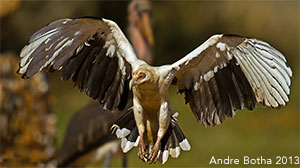BOISE, Idaho – Hornbills, vultures and other birds may be threatened by hunting in the tropical forests of Central and West Africa, according to a new study published in Oryx, the International Journal of Conservation.
Wildlife across the region has been decimated by hunting for the bushmeat trade, with mammals like monkeys and rodents particularly affected. Previous studies found that birds are hunted at relatively low levels, but the new study found an unusually high number of large-bodied birds among the discarded animal remains at remote hunting camps in Cameroon’s Ebo forest. Researchers surveyed the camps over a nine-month period in 2011-12.
The most frequently found bird species, the white-thighed hornbill, had not been recorded by previous studies of the bushmeat trade in Cameroon, which examined nearly 250,000 animal carcasses traded in markets and villages. The remains of palm-nut vultures, an unusual bird of prey that feeds on the fruits of oil palms, crabs, snails and dead animals, were also recorded in high numbers.
“This is concerning from a conservation perspective because hornbills and large raptors such as palm-nut vultures are long-lived and have naturally low reproductive rates, making sustainable populations vulnerable to hunting pressure,” said Munir Virani, head of the Peregrine Fund’s Africa Program and a co-author of the study.
The authors suggest that the high number of bird remains found in hunting camps can be explained by an economic choice hunters make to consume birds when working rather than more commercially valuable species such as duiker and porcupine, therefore maximizing potential profits.
“Previous studies have focused on bushmeat traded commercially or consumed in villages and may have overlooked those animals consumed by hunters in the forest,” said lead author Robin Whytock, of the Ebo Forest Research Project. The bushmeat trade has proven to be a difficult issue to resolve, he said, and the study further highlights the urgent need to develop a practical solution to the problem, which threatens a diversity of wildlife across Africa.
The research was co-funded by the Offield Family Foundation, U.S. Fish & Wildlife Service’s Great Apes Conservation Fund, the Arcus Foundation and Margot Marsh Biodiversity Foundation, with additional support from The Peregrine Fund, British Ecological Society, and Raptor Research Foundation.
For more information, contact:
Erin Katzner
Director of Global Engagement
Main Phone: 208-362-3716
Direct Phone: 208-362-8277
Additional contact
Munir Virani, tpf@peregrinefund.org
011-254-20-3743736
Robin Whytock, robbie@eboforest.org
+44 7772 797 831






